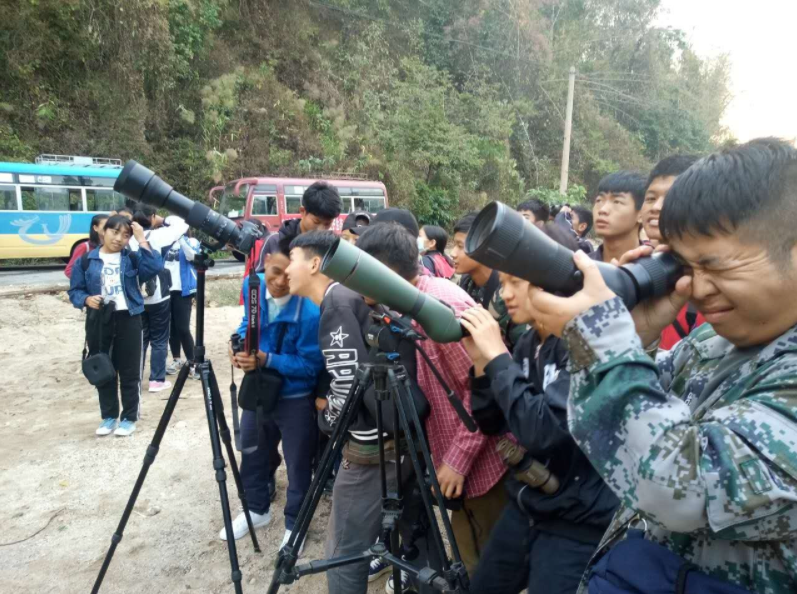Zeng Xiangle: Bird-watching guide with business mind

Editor's note:
Zeng Xiangle comes from east China’s Jiangxi province. In 2014, Zeng had a bird-watching tour in west Yunnan’s Yingjiang. He was deeply fascinated by the lush and virgin forests there, out of which birds and beasts have grown in abundance. Then Zeng chose to stay in Shiti village to be a bird-watching guide.
Besides watching and protecting birds, Zeng also held training sessions on guiding bird-watching tours, via which several youngsters in the village followed his steps and become tour guides. As time went by, more folks in the village served as bird-watching guides and Shiti gained fame. The villagers have boosted their income.
Zeng Xiangle: Bird-watching guide with business mind
In midsummer, the weather in tropical rainforests is sort of unpredictable. In the Shiti village of Yingjiang County, west Yunnan’s Dehong Prefecture, a sudden rainstorm attacked a baby hornbill and its parents that had just came out of their nest in a tree trunk to hunt some food. The little bird, fully saturated by the downpour, fell on the ground, unable to fly away however hard it tried to flap the wings.


Concerned about the bird’s catching a cold, the villagers who caught sight of this showed inclination to take it home for warmth, but their action was stopped by Zeng Xiangle who rushed to the scenes on hearing the news. Zeng found a special spot in the field that was beyond the reach of rain and left alone the bird there. The next day, feathers of the little hornbill dried up and it flew away at ease. Watching in distance the baby hornbill hovering with its parents, Zeng was quite delighted.
“In protecting the wildlife, we’re supposed to follow the law of Mother Nature, without overly interfering into the survival of species,” said Zeng.
Yunnan love out of bird-watching craze
Zeng Xiangle is not a Yingjiang native, but in the border county he is the one of the guys knowing the most about birds.
Aged 31 at present, Zeng Xiangle comes from east China’s Jiangxi province, and he used to work as a new-media reporter at the magazine Chinese National Geographic. Perhaps by chance, Zeng fell in love with bird watching.


As one of the fellows crazy about bird watching, Zeng taught himself in identifying the bird species, while studying on bird distribution and others. Zeng is always taking the thick volume: Handbook of Chinese Bird Species, and so long as he has time, Zeng would read it and take notes, memorizing the bird names and the ways to identify bird species.
In 2014, Zeng Xiangle had a bird-watching tour in Yingjiang. The young bird lover was deeply fascinated by the lush and virgin forests there, out of which birds and beasts have grown in abundance. “I didn’t want to return to my work in Beijing back then,” recalled Zeng.
Geographically, Yingjiang belongs to the Hengduan Mountains, an extending part of the Himalayas. As the elevation ascends northward, varied land features appear in the county one after another: tropical rainforest, tropical monsoon forest, subtropical evergreen broad-leaved forest, moderate-belt bushes and alpine meadows. Thus, the area is endowed with a high degree of biodiversity.
Moreover, Yingjiang is home to 710 bird species, making up 71 percent in Yunnan or 51 percent in China. The celebrated birds involve the hornbill and more. Having investigated for over one month, Zeng decided to settle down in the Shiti village of the county, and he even changed his WeChat profile into the falcon, a rare predatory bird.
Bird-watching guide in Shiti village
Shiti, or stone ladder, is a village near the China-Myanmar border, inhabited by the ethnic groups of Jingpo and Lisu. Roaming in the village, visitors were impressed by the wide and clean roads, as well as arrays of news houses with local ethnic features. One of the houses with a tidy court yard is dwelled by Zeng Xiangle.

It is actually a hut with both unique ethnic customs and modern equipments. Zeng and his wife Yuan Shu rented the dwelling from a native family and then had it renovated. Zeng mostly makes a living by guiding visitors in the bird-watching tours.
With regret, Zeng noticed the fact that villagers were logging the trees and damaging the habitat of birds, in a bid to improve their livelihood. In the end, woods in certain areas were gone but the folks remained in poverty.
To make a difference, local authorities urged the villagers to protect the forests and earn extra income by serving as bird-watching guides. Under the help of local management, Zeng Xiangle, together with Ban Dingying and other local bird lovers, established the Yingjiang Bird Watching Association, devoting themselves to protecting local bird species and boosting the bird-watching economy.
“Bird-watching will bring us money?”, wondered the villagers. To cast off their doubts, Zeng held training sessions on guiding bird-watching tours, via which several youngsters in the village followed Zeng’s steps and became tour guides. As time went by, more folks in the village served as bird-watching guides and Shiti gained increasing visibility among the public, inviting in streams of bird lovers from home and abroad. Now Shiti village is a popular destination for bird-watching activities.


The enriched villagers changed their ways of production, no longer damaging the forests. As ecology of the village was restored gradually, the rare bird species of tiny falcons and blossom-headed parrots have already been spotted.
Reporting by Chen Huijun; Trans-editing by Wang Shixue








